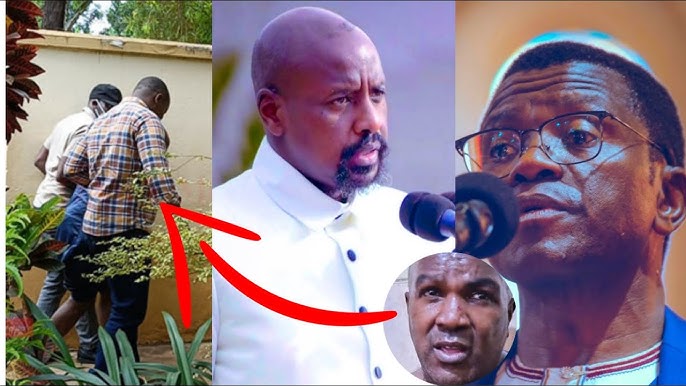
By Alexander Luyima
Kampala, Uganda — When General Muhoozi Kainerugaba, son of President Yoweri Museveni and commander of Uganda’s armed forces, posted images of a battered Eddie Mutwe on social media, he did more than admit to an abduction—he flaunted it. The photos, showing Mutwe’s swollen feet, bruised body, and hollowed expression, were not just evidence of detention but of calculated torture. Then came the taunts: Do you want video proof?
This is not an isolated case. It is the latest in a pattern of state-sanctioned terror that has seen critics, activists, and ordinary citizens disappear into unmarked vehicles, only to resurface—if they resurface at all—broken and traumatized.
A Cycle of Impunity
Mutwe’s ordeal mirrors that of others before him—Kakwenza Rukirabashaija, the satirical writer whose feet were mutilated; the still-missing victims of the infamous Panda Gari abductions; and countless others whose names never make headlines.
When opposition leader Robert Kyagulanyi (Bobi Wine) visited Mutwe in prison, he recounted the horror:
“They beat him for not understanding their language. They spat in his face. They found joy in his pain.”
Mutwe’s feet, like Kakwenza’s, were a primary target—swollen beyond recognition. “He said it felt like elephantiasis,” Kyagulanyi revealed. “He still can’t walk properly. He was also injected with unknown substances three times. He doesn’t know what they did to his body.”
After each torture session, Mutwe was forced to perform frog jumps and press-ups while blindfolded and shackled. “The question was always the same: ‘Who are you to challenge Museveni?’”
When Mutwe saw his family in prison, he broke down. “He cried. In front of his wife, his mother, his baby—he couldn’t finish telling us everything,” Kyagulanyi said. “He says every time he closes his eyes, he sees them coming for him again. He hasn’t slept.”
A Government That Brags About Its Crimes
The most chilling aspect of Mutwe’s case is not just the brutality—it is the state’s shamelessness. Security forces no longer bother with denials. Instead, they dare the public to challenge them.
“When a regime proudly displays its crimes, it means it no longer fears consequences,” says Dr. Livingstone Sewanyana, a human rights lawyer and executive director of the Foundation for Human Rights Initiative (FHRI). “This is the hallmark of absolute impunity.”
The international community has largely remained silent. Western allies, including the U.S. and UK, continue to provide military and financial support to Uganda despite its deteriorating human rights record.
“Silence is complicity,” argues political analyst Nicholas Opiyo. “If foreign governments continue to treat Uganda as a strategic partner while ignoring its atrocities, they become enablers of this brutality.”
Where Does This Leave Ugandans?
For ordinary citizens, the message is clear: No one is safe. Abductions are no longer reserved for high-profile activists—they can happen to anyone, anytime.
“Eddie should be in a hospital, not in a cell,” Kyagulanyi insists. “This is political persecution. What happened to him is not just torture. It is a crime against humanity. And those responsible must be held accountable.”
But accountability remains elusive. The unresolved torture of Dr. Kizza Besigye, the enforced disappearances of opposition supporters, and the open mockery of victims suggest a regime that believes itself untouchable.
The Road Ahead
Uganda stands at a crossroads. With a ruling elite that openly revels in its brutality, the social contract is broken. The question is no longer if more atrocities will occur, but how much longer the world will look away.
As Sewanyana warns: “A government that tortures its own people and boasts about it is a government that has lost all legitimacy. History does not look kindly on such regimes.”
For now, Eddie Mutwe’s shattered body is a testament to Uganda’s descent—and a grim preview of what may lie ahead.
Alexander Luyima is an investigative journalist and human rights advocate focusing on governance and security in East Africa.
“In the end, we will remember not the words of our enemies, but the silence of our friends.” — Martin Luther King Jr.
https://hoimapost.co.ug/torture-as-theater-ugandas-regime-flaunts-brutality-in-the-case-of-eddie-mutwe/
https://hoimapost.co.ug/torture-as-theater-ugandas-regime-flaunts-brutality-in-the-case-of-eddie-mutwe/ , hoimapost.co.ug
https://hoimapost.co.ug/torture-as-theater-ugandas-regime-flaunts-brutality-in-the-case-of-eddie-mutwe/ , https://hoimapost.co.ug/torture-as-theater-ugandas-regime-flaunts-brutality-in-the-case-of-eddie-mutwe/ ,
hoimapost.co.ug , https%3A%2F%2Fhoimapost.co.ug%2Ftorture-as-theater-ugandas-regime-flaunts-brutality-in-the-case-of-eddie-mutwe%2F